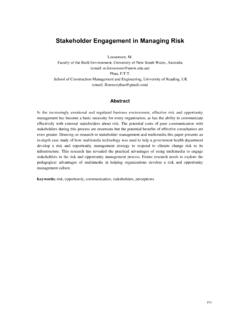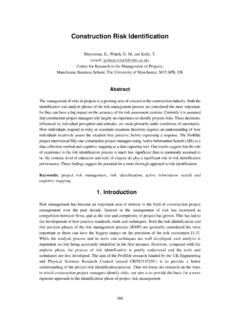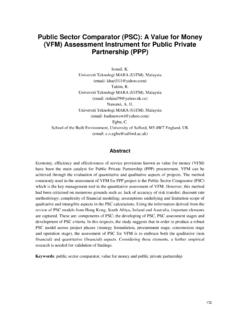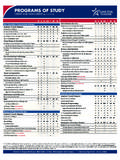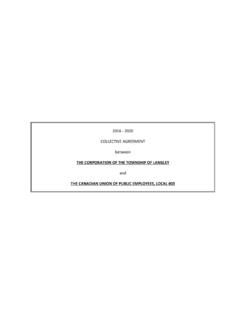Transcription of Informal Contractors in Tanzania-their Characteristics and ...
1 Informal Contractors in Tanzania-their Characteristics and reasons for informality R S MLINGA. University of Cape Town Private Bag Rondebosch 7700, South Africa N M LEMA. University of Dar-es-Salaam Box 35131, Dar-es-Salaam, tanzania Abstract This paper discusses the Informal construction sector in tanzania , its composition, structure, size and its importance to the national economy. Problems faced by the sector and its interaction with the formal sector are also discussed. The discussion is based on three studies which were carried out on the Informal sector in tanzania .
2 These are the National Informal Sector Survey, the Dar-es-Salaam Informal Sector Survey and the Study on Tanzanian Informal Contractors conducted in 1991, 1995, 1999/2000 respectively. The first two surveys cover the Informal sector as a whole, while the last study concentrates only on Informal Contractors . The studies address different aspects of the Informal sector. The aim of this paper is to gather the different aspects of the Informal construction industry as captured in those studies. It is observed that the sector is growing fast and absorbs the fast growing urban labour reserve.
3 However, it is noted that, there are various problems, which need to be addressed to enable the sector, register its significance to the economy. Notable problems include lack of capital, limited technical and commercial skills, and an insecure operating environment. Key words: Construction sector, Informal construction sector, tanzania . INTRODUCTION. During the first meeting of CIB Task Group 29 (TG 29) it was generally agreed that the Informal construction sector forms a very important part of construction industries of developing countries (Mlinga, 1998); Ngare, 1998; Wells, 1998).
4 Little was however known on the Characteristics of the sector and therefore no concrete policy measures could be proposed or undertaken to develop it. This paper discusses Informal Contractors in tanzania . The discussion is based on the National Informal Sector Survey (NISS) of 1991, the Dar-es-Salaam Informal Sector Survey (DISS) of 1995, and a Study on tanzania Informal Contractors (STIC) conducted by the present authors in 1999/2000. The authors' study involved Informal Contractors in four selected fast growing cities/municipalities Dar-es-Salaam, Arusha, Mwanza and Dodoma.
5 This paper, discusses the Characteristics of Informal Contractors , the reasons why they do not formalise their businesses, their collaboration with other Informal sector players and formal Contractors , and lastly, their operating problems. Informal Contractors TANZANIAN CONTEXT. The definition adopted at the first meeting of the CIB Task Group 29 [Wells (1998)] for the Informal construction sector is reproduced below: The Informal construction sector comprises unregistered and unprotected individuals and small enterprises that supply labour and contribute in various other ways to the output of the construction sector.
6 Using the above definition, and within the Tanzanian context, Informal Contractors would mean those enterprises or individuals carrying out, and supplying labour for, construction work without business licences and/or registration with the Contractors Registration Board (CRB). The CRB is a statutory organisation established by Act of Parliament No. 17 of 1997 and charged with the responsibility of registering and regulating activities and conduct of Contractors in tanzania [GOT (1997)]. Currently the CRB classifies and registers Contractors into seven classes under five categories namely, Civil works, Building, Mechanical, Electrical and Specialist Contractors .
7 The various categories of Contractors and their class limits are shown in Table 1. CLASS LIMIT FOR ANY SINGLE CONTRACT (in million Tshs.). CLASS. CIVIL BUILDING MECHANICAL ELECTRICAL SPECIALIST. I Unlimited Unlimited Unlimited Unlimited Unlimited II 3,000 800 500 500 100. III 1,000 600 300 300 50. IV 500 400 200 200 - V 300 200 100 100 - VI 100 100 50 50 - VII 50 50 20 20 - Table 1: Class limits for various types of Contractors in tanzania Source: Mugasa (1999). Like any business, to conduct construction business in tanzania without a valid business licence or without being registered are punishable offences [GOT (1997), GOT (1998)].
8 The CRB however allows unregistered Contractors ( Informal Contractors ) to operate as long as the value of the projects is small , not exceeding Tshs. one million. However, three issues need to be raised here. First, as it will be shown, most of the jobs carried out by the Informal Contractors are labour only contracts. A Tshs. one million labour contract is therefore quite substantial especially if few individuals do it in a short period. Second, for big projects executed in phases of relatively short intervals, there could be several one million labour only contracts whose total value would exceed the allowed amount.
9 Third, a successful Informal contractor can obtain many such small contracts, with a substantial annual turnover. This argument is presented to challenge the basis on which the Tshs. one million ceiling has been arrived at. However, while this remains a challenge to CRB, it is a loophole that can be used by the Informal Contractors to carry out their business unhindered.. In summary, what has been discussed above shows the boundaries within which unregistered Contractors can operate. It is important at this stage to define those boundaries, in order to clarify what the term Informal contractor means in tanzania .
10 THE INTERFACE: FORMAL AND Informal Contractors . Classification into formal and Informal Contractors Mlinga (1999), using a classification system and framework for Contractors development proposed by (Milne, 1994), attempted to classify Tanzanian Contractors on the basis of their size and their informality (see Figure 1). At the interface of Informal and formal Contractors , there are established Informal Contractors and small emerging Contractors . Established Informal Contractors here are taken to mean those Informal Contractors who possess minimum requirements to register a company at entry level.




